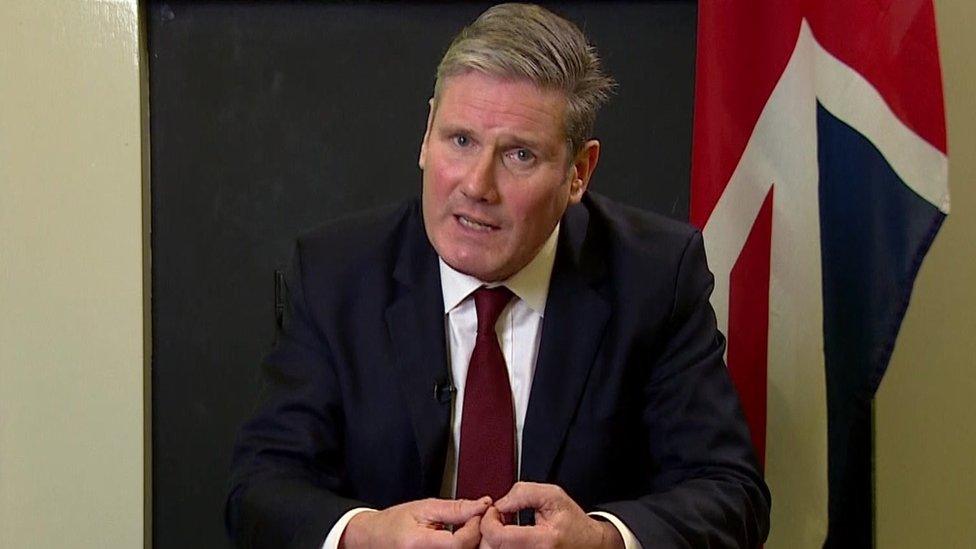Covid: England's third national lockdown legally comes into force
- Published
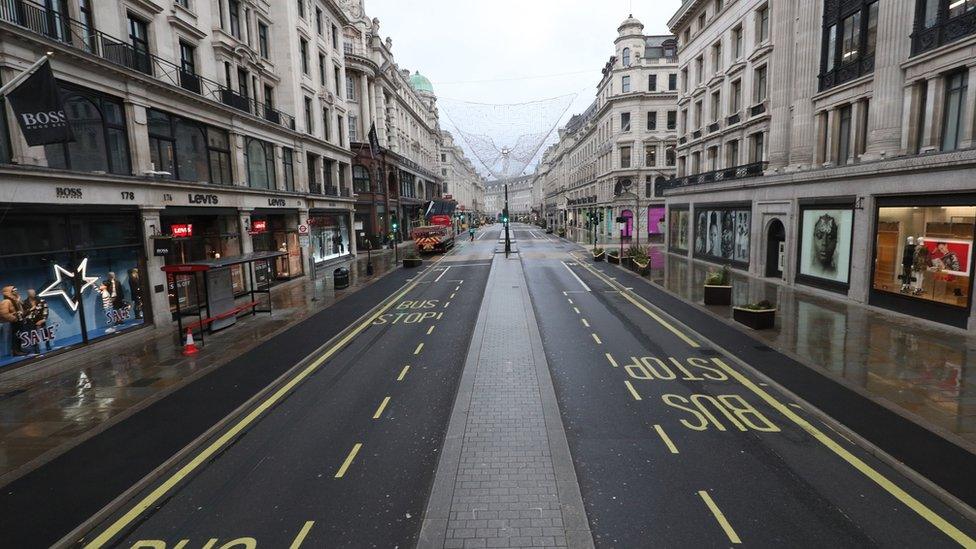
London's Regent Street, normally packed with people and traffic, is deserted
England's third national lockdown has legally come into force, with MPs set to vote retrospectively on it later.
The measures, which include, external a stay-at-home order and the closure of schools to most pupils, were announced by the prime minister on Monday.
All of the UK is now under strict virus curbs, with Wales, Northern Ireland and most of Scotland also in lockdown.
On Tuesday the number of new daily confirmed cases of Covid in the UK topped 60,000 for the first time.
And it is thought one in 50 people in private households in England had the virus last week - rising to one in 30 in London.
Figures from the Office for National Statistics, external also suggested more than one million people in England had Covid between 27 December and 2 January.
At a Downing Street news conference on Tuesday, Prime Minister Boris Johnson said he had "no choice" but to impose the new lockdown, with the number of patients in hospitals 40% higher than in the first peak.
He would not guarantee that all children would be back in school before the summer holidays but insisted he was full of "optimism and fundamental hope" that things would be different in the spring.

The need to debate and vote on the measures means the House of Commons has been recalled from its Christmas break for the second time - the first being for the post-Brexit trade deal with the EU.
Mr Johnson will update MPs, most of whom will not physically be in the chamber, on the new rules before the vote, which is due in the evening.
The regulations, which allow the lockdown to be in place until the end of March, are expected to pass with ease - as Labour is set to support the motion.
Under the measures, people in England will only be able to go out for essential reasons, exercise outdoors will be allowed only once a day, and outdoor sports venues must close.
Meanwhile, Covid vaccine deployment minister Nadhim Zahawi said new daily vaccination figures for the UK - which will be released for the first time on Monday - will show there has been a "significant increase" in the number of people who have received the jab.
On Tuesday, Mr Johnson said 1.3 million people in the UK had been vaccinated so far.
The government has set the target to immunise all over-70s, the most clinically vulnerable and front-line health and care workers by mid-February - some 13 million people - which would require around two million vaccinations a week.
Mr Zahawi said he was "confident" the government would meet the "ambitious" target, adding that community pharmacies would be brought in to assist the vaccination programme.
"We will make sure that community pharmacies and the independent sector are involved and that we deliver what I think is a credible plan that the NHS has put together to hit that target of 13 million vaccinations ... by mid-February," he told BBC Radio 4's Today programme.
On the same programme, Royal Pharmaceutical Society president Sandra Gidley accused the government of ignoring an "army" of small pharmacies. Thousands of high street chemists were "ready, willing and able" to help, she said.
In other developments, Education Secretary Gavin Williamson is to make a Commons statement later about the cancellation of A-Level and GCSE exams in England.

Any rebellion will be small

England's lockdown came into force legally overnight. But it's actually today that the measures will be brought before MPs.
Any rebellion by Conservative MPs is expected to be smaller than those seen late last year on restrictions.
However, some do want more of a say in the next couple of months over how long the regulations might last.
On Tuesday, Boris Johnson said that by mid-February - with hopes for the vaccine rollout - there is the "prospect" of beginning the relaxation of some measures.
But at the same news conference, England's chief medical officer Prof Chris Whitty said we shouldn't "kid ourselves" that the virus will disappear with the spring - and suggested a "few" restrictions might have to be brought in next winter.

At-a-glance: New rules in England
People cannot leave their homes except for certain reasons, like the first lockdown last March
These include essential medical needs, food shopping, exercise and work for those who cannot do so from home
All schools and colleges will close to most pupils from Tuesday with remote learning until February half-term
Early years settings such as nurseries will stay open
End-of-year exams will not take place this summer as normal
Elsewhere, university students should not return to campuses and will be taught online
Restaurants can continue to offer food delivery, but takeaway alcohol will be banned
Outdoor sports venues - such as golf courses, tennis courts and outside gyms - must close
But outdoor playgrounds will remain open
Amateur team sports are not allowed, but elite sport such as Premier League football can continue

Elsewhere in the UK, Scotland's First Minister Nicola Sturgeon also announced a new lockdown on Monday - across mainland Scotland, Skye, Arran, Bute and Gigha for the rest of January. Level three restrictions apply in the remaining areas of the nation.
Wales has been in a national lockdown since 20 December, and schools and colleges in the nation will remain closed until at least 18 January.
In Northern Ireland - which entered a six-week lockdown on 26 December - "stay at home" restrictions will be brought back into law from Friday.
Boris Johnson: "We've now vaccinated over 1.3m people across the UK"
The UK government's chief medical adviser, Prof Chris Whitty, urged people to take the "stay at home" rules seriously and warned that the country is facing a "really serious emergency".
He cited the ONS data for England as showing how widespread the virus is.
"We're now into a situation where across the country as a whole, roughly one in 50 people have got the virus, higher in some parts of the country, lower in others," he said.
He also said some restrictions may have to be introduced again next winter.
Prof Graham Medley, a member of Scientific Advisory Group for Emergencies (Sage), said "we're in for a long haul" with coronavirus.
He told Today: "Vaccination is a way out, but I think he's right to raise that possibility that there could be - next winter or even the winter after - the possibility that we will see a resurgence of Covid to such an extent that government again has to take measures to prevent another large outbreak."
That latest estimates include:
One in 30 for London
One in 45 for south-east England, eastern England and north-west England
One in 50 for the East Midlands
One in 60 for north-east England
One in 65 for the West Midlands and Yorkshire and the Humber
One in 135 for south-west England
Labour leader Sir Keir Starmer called for the government to use the lockdown to create a "round-the-clock" vaccination scheme in order to end "this nightmare".
In a televised address to the nation, Sir Keir also confirmed he would back the new restrictions on Wednesday.

LOOK-UP TOOL: How many cases in your area?
YOUR QUESTIONS: We answer your queries
GLOBAL SPREAD: How many worldwide cases are there?
THE R NUMBER: What it means and why it matters

In other developments:
Travellers to the UK from abroad could soon be required to prove they have had a negative coronavirus test
The Met Police said Londoners should expect officers to be more "inquisitive" about why they are "out and about" during lockdown
New car registrations sunk to a 30-year low last year, figures show, after showrooms and factories shut down during the first lockdown
BBC TV is to help children keep up with their studies during the latest lockdown by broadcasting lessons on BBC Two and CBBC


THE FRESH PRINCE OF BEL-AIR: Turn up the nostalgia with this classic 90s comedy
FILMS FOR EVERYONE: A huge selection of films to stream to make lockdown a bit more entertaining


How have you been affected by Covid? What will lockdown mean for you? Please get in touch by emailing haveyoursay@bbc.co.uk, external.
Please include a contact number if you are willing to speak to a BBC journalist. You can also get in touch in the following ways:
WhatsApp: +44 7756 165803
Tweet: @BBC_HaveYourSay, external
Please read our terms & conditions and privacy policy
If you are reading this page and can't see the form you will need to visit the mobile version of the BBC website to submit your question or comment or you can email us at HaveYourSay@bbc.co.uk, external. Please include your name, age and location with any submission.
Related topics
- Published5 January 2021
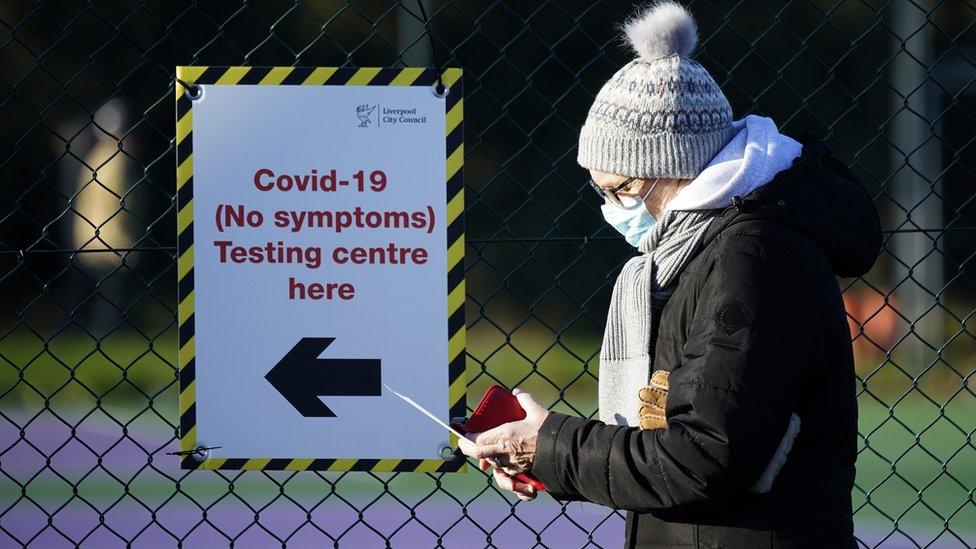
- Published6 January 2021
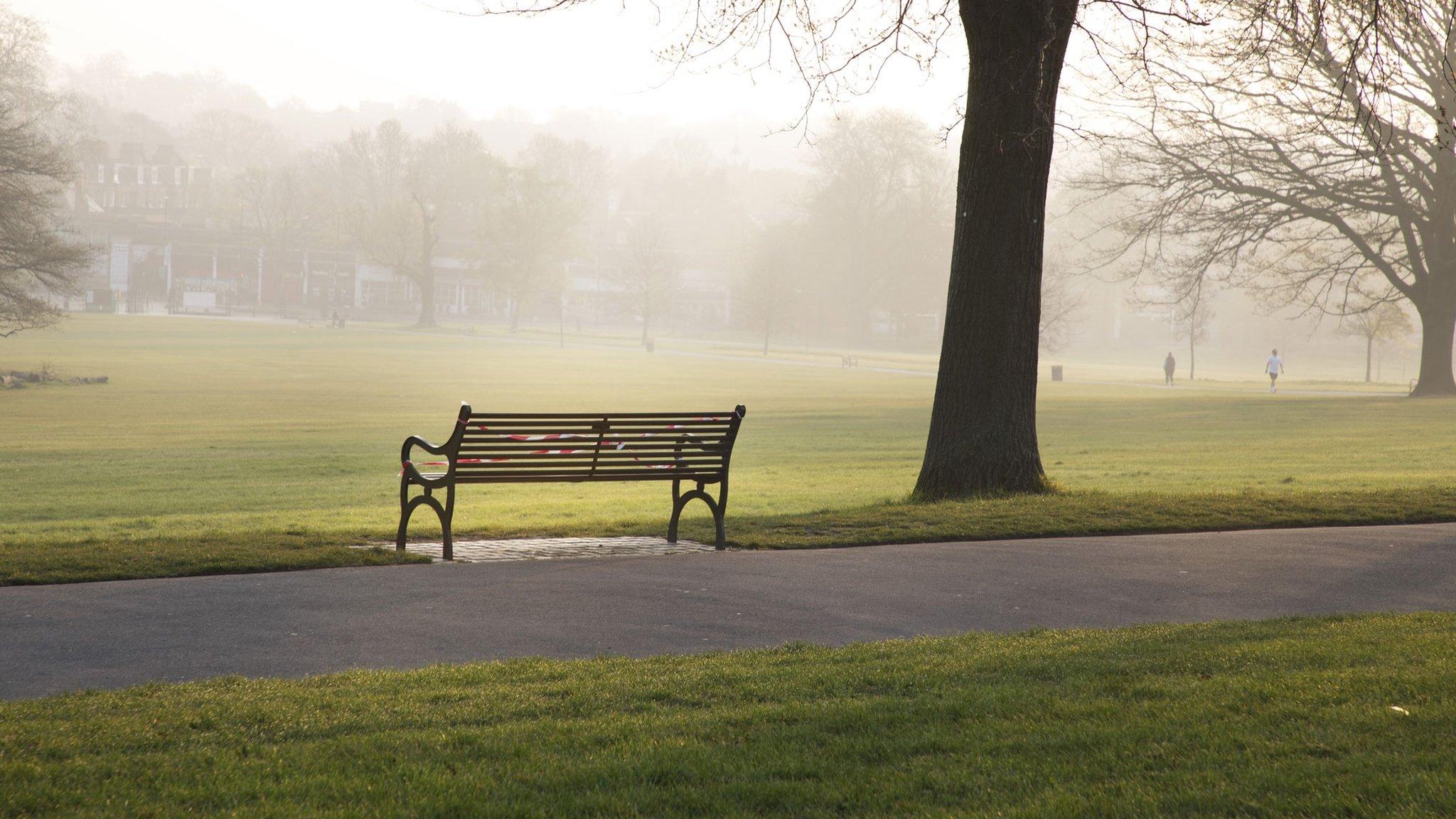
- Published2 April

- Published1 July 2022

- Published5 January 2021
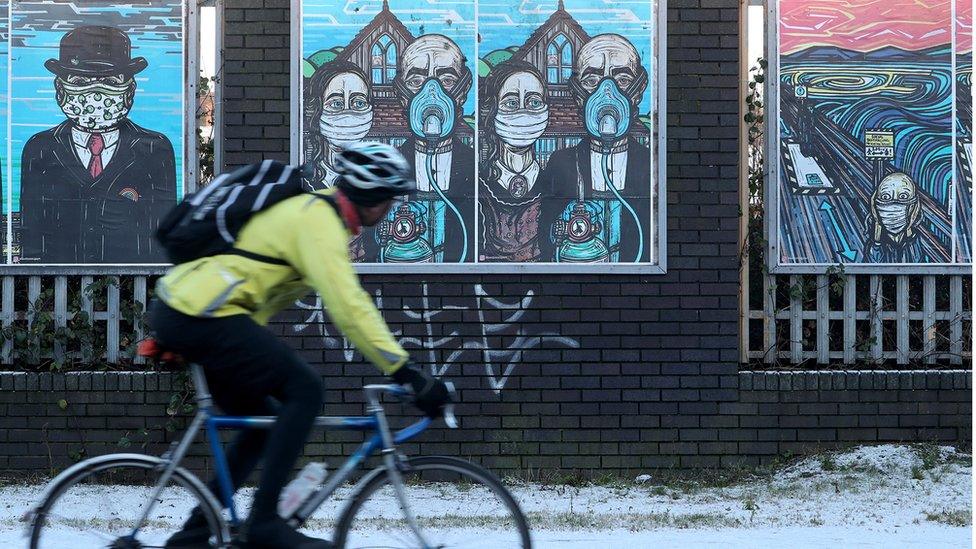
- Published5 January 2021
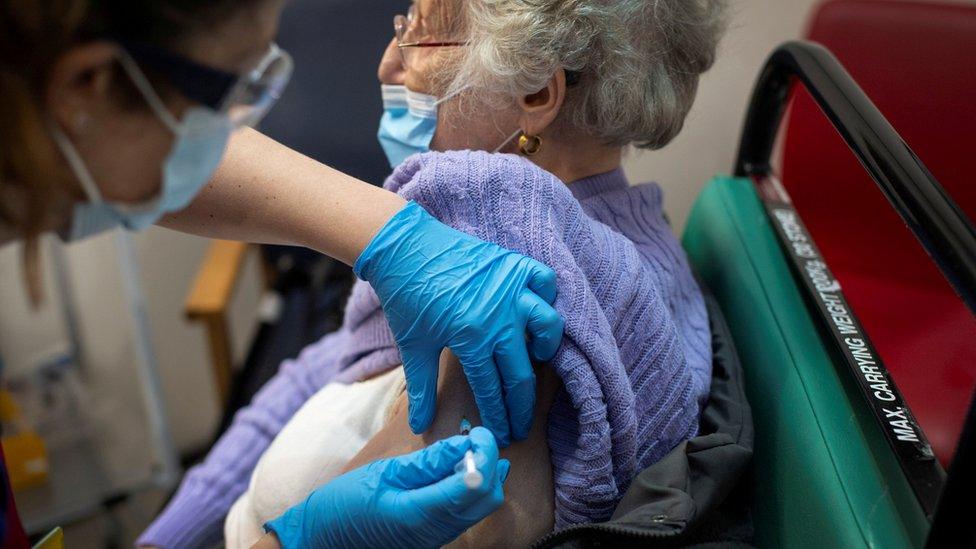
- Published5 January 2021
